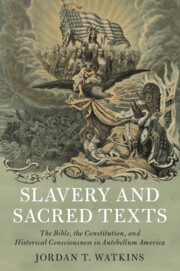 Slavery and Sacred Texts
Slavery and Sacred Texts Book contents
- Slavery and Sacred Texts
- Cambridge Historical Studies in American Law and Society
- Slavery and Sacred Texts
- Copyright page
- Dedication
- Contents
- Acknowledgments
- Prologue
- Introduction
- 1 “Recourse Must Be Had to the History of Those Times”
- 2 “The Ground Will Shake”
- 3 “Texts … Designed for Local and Temporary Use”
- 4 “The Further We Recede from the Birth of the Constitution”
- 5 “The Culture of Cotton Has Healed Its Deadly Wound”
- 6 “Times Now Are Not as They Were”
- 7 “We Have to Do Not … with the Past, but the Living Present”
- 8 A “Modern Crispus Attucks”
- Conclusion
- Epilogue
- Index
5 - “The Culture of Cotton Has Healed Its Deadly Wound”
Published online by Cambridge University Press: 12 June 2021
- Slavery and Sacred Texts
- Cambridge Historical Studies in American Law and Society
- Slavery and Sacred Texts
- Copyright page
- Dedication
- Contents
- Acknowledgments
- Prologue
- Introduction
- 1 “Recourse Must Be Had to the History of Those Times”
- 2 “The Ground Will Shake”
- 3 “Texts … Designed for Local and Temporary Use”
- 4 “The Further We Recede from the Birth of the Constitution”
- 5 “The Culture of Cotton Has Healed Its Deadly Wound”
- 6 “Times Now Are Not as They Were”
- 7 “We Have to Do Not … with the Past, but the Living Present”
- 8 A “Modern Crispus Attucks”
- Conclusion
- Epilogue
- Index
Summary
This chapter focuses on the constitutional debates of the early 1850s, when many antislavery writers narrated both the progress of moral insight, which they viewed as embodied in the rise of antislavery sentiment, and the Slave Power’s advances, which they tracked in the Fugitive Slave Act, fugitive slave cases, and the Kansas-Nebraska Act. In attempts to reconcile their perceptions of both general moral progress and peculiar moral decline, these writers characterized proslavery advances as anachronistic deviations from founding-era expectations and slavery’s unexpected spread as antithetical to the egalitarian spirit of their age. All of this indicated just how different the revolutionary past was from the present, signaling to their contemporaries that it was time to realize the permanent truths that had been enunciated in the transient founding past. In short, antislavery writers promoted a historical consciousness attentive to historical distance: sometimes they narrated the growth of moral opposition to slavery since the founding, and sometimes they narrated the Slave Power’s rise since that time, but in both cases, they pointed to the reality of change over time.
Keywords
- Type
- Chapter
- Information
- Slavery and Sacred TextsThe Bible, the Constitution, and Historical Consciousness in Antebellum America, pp. 183 - 228Publisher: Cambridge University PressPrint publication year: 2021
